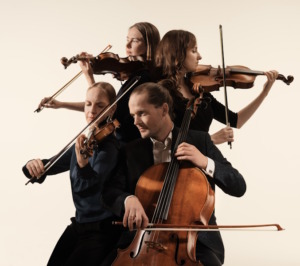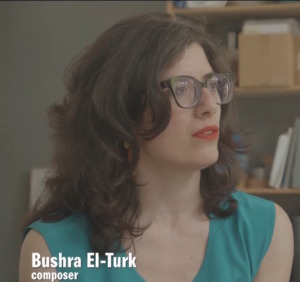In the fifteen years since we founded the Dudok Quartet Amsterdam, our group has interacted with a multitude of artists over a wide spectrum of disciplines. From the most obvious neighbouring specialisms such as keyboardist and wind instrument players, we went on to collaborate with singers, dancers, choreographers and conductors, through to audio engineers, TV personalities and label managers. I cherish wonderful memories from (almost) all of these artistic partnerships. There is one craft that is quite distinct from all the others and from the one we practice on a daily, namely that of a composer.

Dudok String Quartet. Photo Merlijn Doomernik
My wife and colleague Judith van Driel and I first started playing string quartets pre-Dudok, over half a lifetime ago. At that time I was not quite conscious of the fact that this particular medium also encompassed music that had been written by people that were still currently breathing. I did know contemporary music, but only in non-classical genres. I produced electronic dance music in niche genres as a hobby, I was aware of the most important figures in the American rap music scene and I loved listening to big bands and jazz chamber music. The main force of attraction that made us take up the tremendous task of working as a full-time string quartet was the classical canon. When I first learnt of the works of the Kronos Quartet (reinventing the genre at every next turn) and the Turtle Island String Quartet (consisting of four exquisite composer-performers) my worldview shifted considerably! Over the next fifteen years, our concerts would often incorporate newly written works, contemporary classics and our own arrangements.

Dudok Quartet Amsterdam. Photo Green Room Creatives Yuri Andries
Commissioning composers is among the most precious areas of our work. Early meetings with composers consist of scanning each other’s opinions, intentions and aesthetics. After a couple of months, sometimes arched over by more meetings or attending concerts with earlier works, we receive a first blueprint. The sensation of opening a musical score for the first time is a unique experience. One which varies greatly from one composer to the next. It could resemble the unfolding of a board game instruction manual, peeking in someone’s private diary, browsing a cookbook or a furniture catalogue, or figuring out the legend of a hidden treasure map. Through reading performance indications, pitch durations and volume suggestions we try to connect with another human being both emphatically and intellectually. The great gift of working with living composers is that these connections work both ways, or even triangularly if you include the listeners!

On February 3 2024 we will give the world premiere of Three Tributes, a new work written for us by London-born composer Bushra El-Turk. This new set of pieces takes the form of three portraits of Levantine female singers who lived during the Nahda period, a cultural renaissance in the Arabic-speaking world that took place between the mid-19th and early 20th centuries. Her works often integrate musical traditions from different cultural backgrounds, and furthermore explore a spectrum between written music and improvisation and between music and theatre. In the case of Three Tributes, this approach evokes a fascinating style of string quartet playing. She asks us to interact with written-out expressive microtonal polyphony while adding our own expressive inspirations as we develop the performance. The results take shape as three biographical tributes which unravel in unpredictable ways because of its improvisational elements, but always eloquently, energetically and passionately.
We are grateful to the Borletti-Buitoni Trust, who have made our dream of working with Bushra El-Turk reality by sponsoring the commissioning of Three Tributes, together with String Quartet Biennale Amsterdam and West Cork Chamber Music Festival.